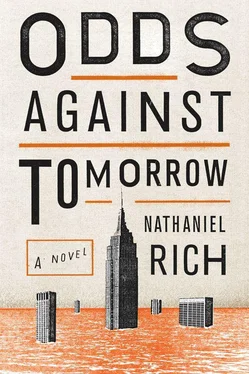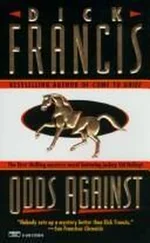“You didn’t do it.” She pointed to her heart. “I did. I did it all by myself.”
The two paramedics, each holding one of her tiny elbows, escorted her from the hall.
On the screen a section of the Alaskan Way Viaduct, clogged with morning commuter traffic, collapsed. The giant concrete slab dropped twenty feet, shattering on the pavement below like a pane of glass. The cars bounced like dice.
* * *
When we graduated in June, the panic raised by the Puget Sound earthquake had become part of us. It was slapped across our faces like a birthmark. We were dubbed Generation Seattle. Both the best and the worst suddenly seemed possible. Elsa Bruner, I learned, had dropped out and started a cooperative farm in Maine. Mitchell, like so much of our class after Seattle, moved to New York for a financial consulting job. We fell out of touch. I never saw him again, at least not in the flesh. I wish I could say that we’d been the best of friends, but today I consider myself lucky to have known him at what, I now realize, was a crucial stage in his development.
To tell the truth, I was as shocked as everyone else when I found out what happened to Mitchell Zukor.
1.
The Seattle settlements, to be certain, unnerved nearly every private enterprise in America. But no company had greater cause for anxiety than Fitzsimmons Sherman, which employed more than three hundred workers in offices honeycombed across the seventy-fifth and seventy-sixth floors of the Empire State Building. The Empire State was the most disaster-prone building in America. It had to be evacuated nearly once a year — for no-fly-zone infractions, bomb threats, tropical storms, and blackouts. Fitzsimmons Sherman was the building’s largest tenant, and its wealthiest. After the Supreme Court affirmed the record settlements, Fitzsimmons’s chairman, the ursine, mouth-frothing Sanford “Sandy” Sherman, called an emergency board meeting. The executives and their team of lawyers assembled early one June morning at Sherman’s Sagaponack estate. The windows of the conference room were fogged over with the mist that rose from the ocean. The executives hovered like seagulls over a spread of bagels, lox, and sturgeon. The expensive fish seethed a salty, humid aroma, indistinguishable from the smell of dirty dollar bills.
Once everyone was seated, Sandy Sherman, standing at the end of the massive oval table, asked a question that had haunted him for years: “If the Empire State Building fell, how much would it cost Fitzsimmons? Could we avoid paying as much as our friends in Seattle?”
Fitzsimmons’s friends in Seattle had paid dearly. The loss of life, though regrettable, they could overcome. It was the loss of capital that brought the chief executives to their knees. Even before the ground stopped trembling, the families of the earthquake victims had enacted that uniquely American mourning ritual: they filed class action lawsuits. The lawsuits alleged that the corporations that held offices in downtown Seattle had needlessly endangered their employees’ lives. The companies, in other words, were asked to pay for their dead.
The business leaders of Seattle were outraged. How could they have foreseen the horrors that had engulfed their city? How could they have known that the Emerald City Tower would compress like an accordion or that the black windows that sheathed the seventy-six-story Columbia Center would shatter like a mirror? Sure, they understood the general threat. A significant earthquake struck northwestern Washington every twenty years, and a megathrust earthquake — greater than 9.0 on the Richter scale — every three or four centuries. The Juan de Fuca tectonic plate, located just fifty miles off the coast, was the site of the largest earthquake ever to have struck North America, the Cascadia megathrust earthquake of January 26, 1700. But what were the odds that Seattle would be hit by another Big One anytime soon? In the first decade of the millennium Seattle had relaxed restrictions on building heights in order to encourage downtown growth. If the city’s Department of Planning and Development had approved plans to build skyscrapers, how could the CEOs be expected to know better? They were in the businesses of Internet commerce and banking, after all. They knew nothing about seismology. They were masters of industry, not masters of the universe.
The juries saw images of the bonfires that engulfed the Seattle Art Museum and the white geyser of glass that shot into the clouds when the Central Library imploded. A dozen times they were forced to watch the famous video of the Space Needle falling, its tip piercing the dome of the planetarium, popping it like a blister. They learned that seismologists had given Seattle an eighty percent chance of being hit by a megathrust earthquake before 2060; that the high-rises were known to be vulnerable; that aftershocks, some of them large earthquakes in themselves, would continue for years, perhaps even a decade. They listened to 911 tapes, recorded statements by people who had watched their husbands and wives plunge into Elliott Bay, and heartbreaking testimonies from the children of the deceased. Yes, someone needed to pay for this.
And so the business leaders of Seattle, having already suffered immeasurable financial losses, were ordered to pay settlements to their employees’ families. Blood would be converted into treasure.
The exchange rate was brutal. That’s because the insurance industry, after the terrorist attacks at the turn of the century, had discontinued major catastrophe coverage. The corporations’ insurance plans were worthless. This was a catastrophe in itself. “My God, what did we do to deserve this?” said one business leader to The Seattle Times shortly before his firm sent him to a weeklong sensitivity retreat on Fidalgo Island.
Sandy Sherman therefore found himself in a difficult position. Fitzsimmons’s insurance plans, because of the prohibition on catastrophe coverage, would not protect them. But fleeing New York City, or even the building, was inconceivable. The firm would be perceived as craven, weak, fearful. Or worse: un-American. Shares would cannonball. No, they had to stay put.
“Fitzsimmons is on its own,” bellowed Sherman. “So what now, boys?” he added, despite the fact that in the room there were seated two female executives and five female secretaries, all of whom were now busily investigating the carpet.
Sherman’s underlings mimicked expressions of perplexity. They knew better than to speak up, so it is impossible to imagine how long the room might have remained silent were it not for the interjection of a junior account associate from the Department of Equity, Assets, and Derivatives who was in attendance only because he had been asked to serve as proxy for his vacationing boss.
“I don’t mean to sound morbid,” said this junior associate, but his voice caught. He was distracted by something outside the window. The fog had cleared, and a pleasure yacht could be seen gliding just off the coast. The lights in the cabin were out, and nobody was on deck. It seemed, in fact, that nobody was on the boat — that it had been cut loose from its mooring and was drifting toward the ocean. Was it possible that there was nobody on the boat?
Thick necks chafed against starched collars as the pink faces turned to regard the young man.
“Excuse me,” said the junior associate, his fingers shaking under the table. “I just mean to say that, if our building collapsed, then…” He trailed off, his cheeks flaring with panic.
“Speak up,” Sherman yelled.
“Sorry. I was saying, if the building collapsed—”
“Yes?”
“—if the Empire State Building was destroyed, wouldn’t we all be dead?”
Читать дальше












